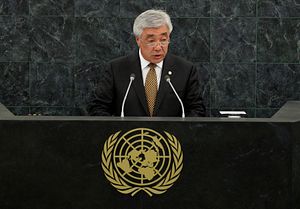Twenty years ago today, April 24, 1995, was a momentous day in Kazakhstan’s history. It was the date when the last nuclear warhead was finally removed from our land, eliminating peacefully the world’s fourth largest nuclear arsenal.
It is an historic step which continues to define our country. Kazakhstan is now recognized globally as a passionate campaigner for peace and nuclear disarmament. It is also a date which continues to be celebrated by our citizens who know all too well the terrible damage that nuclear weapons cause.
Kazakhstan is among the few countries that have suffered most from the human and environmental devastation of nuclear testing. The Semipalatinsk site, in the north of our country, for more than four decades was the scene of more than 450 nuclear explosions in the air, above and under the ground. Many were held when little was known about the long-term impact of radiation with precautions often either non-existent or rudimentary.
But over time, the terrible effects became all too clear. Many thousands of people have died from radiation diseases. Hundreds of children have been born with disabilities.
It is this legacy which led, even before our country fully regained its independence in 1991, to our President Nursultan Nazarbayev closing the Semipalatinsk test site. It was followed within months with the almost unprecedented decision to give up voluntarily the nuclear weapons we inherited on the break-up of the Soviet Union.
But even though the Semipalatinsk test site has now been shut for almost 25 years, there is no escaping its dark shadow. Huge areas of our land are still contaminated. Ill-health and birth defects in the adjacent areas are still far too common.
This history explains the determination of Kazakhstan and its citizens to campaign for a permanent end to nuclear testing and, in the long run, a nuclear weapon-free world. We don’t want another country or its people to suffer such a terrible fate. We will be taking this message to the United Nations when member countries meet next week to take stock of progress on the Non-Proliferation Treaty for Nuclear Weapons.
It is not all bad news. We have seen, for example, the creation of a nuclear-weapons-free zone in Central Asia which has been supported by all the five main nuclear powers. There has been a welcome increase in precautions to stop nuclear material from falling into the hands of terrorist and militant groups. It was at our initiation that the United Nations designated 29 August – the day Semipalatinsk was shut – the official International Day against Nuclear Tests.
We have also seen, thanks to the efforts of all countries involved, welcome moves towards a lasting solution on Iran’s nuclear ambitions. All nations, of course, including our neighbor across the Caspian Sea, have the absolute right to develop a civilian nuclear energy program. The challenge is to enable this while preventing any further spread of nuclear weapons.
We hope that the creation of an international low enriched uranium fuel bank, under the auspices of the International Atomic Energy Agency, can help meet this challenge as one of the key components of ensuring the safety of the international nuclear fuel cycle. As the world’s largest producer and supplier of uranium, with good relations with all the main nuclear powers and a track record on nuclear security and disarmament, Kazakhstan has the ideal credentials to host the fuel bank. The IAEA is enthusiastic to take up our offer and our talks with the agency are close to agreement.
But despite these steps in the right direction, the threat to all our futures from nuclear weapons remains all too real. Our world remains a long way from a universal and legally binding agreement to ban nuclear testing. And while there is a widespread commitment to work towards eliminating nuclear weapons, enough warheads remain to destroy life on our planet many times over.
It is why, at the NPT Review Conference next week, Kazakhstan will be urging countries to be bolder and braver in ridding themselves of nuclear weapons. But we also recognize the importance of public opinion in encouraging leaders to act decisively on this hugely important issue.
It was to help raise global awareness that the international ATOM (Abolish Testing. Our Mission) Project was launched by Kazakhstan to mobilize public opinion over nuclear weapons. Already 160,000 people globally have signed the project’s online petition calling on world leaders to renounce formally and permanently nuclear testing.
This message has also been taken to the roads of the USA in recent days. The ATOM Project has, in collaboration with the Norwegian NGO “Bike for Peace” and the International group “Mayors for Peace,” organized a bike tour from Washington, D.C., to New York to help build public pressure for countries to move.
The “Bike Away the Atomic Bomb” ride finishes at the Dag Hammarskjold Plaza next to the United Nations Secretariat today – a fitting way to mark the 20th anniversary of that final nuclear warhead leaving Kazakhstan. We hope our country’s history and example can provide encouragement to other nations to turn their back on these terrible weapons and make our world and futures safer.
The author is Foreign Minister of Kazakhstan.

































